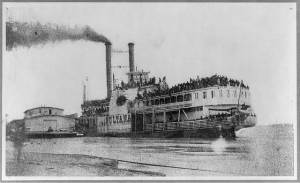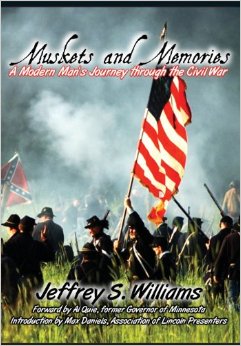“A Soldier’s Story” – from the Sultana
A new website was launched last month called Sultana Remembered, by the Association of Sultana Descendants and Friends. This is one of their stories.
In April of this year, seventy-five members of the Association of Sultana Descendants and Friends came to the Carter House, the centerpiece of the Battle of Franklin, TN of November 30, 1865. The visit was an important part of their tour of the Franklin battlefield area because many of them had an ancestor who was part of the Union army which defended itself against General Hood’s Confederates on November 30, 1864.
Most of the soldiers who were captured at Franklin ended up on the ill-fated steamer, the Sultana. This boat, which exploded and burned to the waterline on April 27, 1865, was carrying approximately 2,400 recently released prisoners of war on their way home from Confederate prisons. This event stands today as this country’s worst marine disaster.
The group listened in fascination as Carter House Historian David Fraley recounted the events leading up to and including the action around the Carter House. It was agreed by all that his presentation helped everyone see and feel what the soldiers and sequestered members of the Carter family felt on that day.
For those whose ancestors stood on this very ground it was an especially moving experience. My own great-great grandfather, Pvt. Adam Schneider, 183rd Ohio Infantry, had been mustered into this newly formed regiment just weeks before in Cincinnati, where he and his family had emigrated from Germany in 1854. He was a “standby,” or a “100% man,” who was called into service when one of the original draftees from the city’s 12th Ward couldn’t fulfill his obligation.
At 42, he was three years shy of the cutoff age for the draft at that time. When his regiment headed for Franklin after only three weeks of training, he left a wife and three small daughters at home.
Arriving at Franklin after joining Schofield’s army at Spring Hill, most of the183rd was placed near the Carter House among veteran troops, with the thought that Hood would not attempt a frontal assault against the entrenched Union army. Of course, that is exactly what he did and my grandfather was captured that day, taken to Cahaba Prison near Selma, Alabama, and ultimately ended up on the Sultana that following April. I am sure he boarded the boat happily anticipating being reunited with his family.
He never had that reunion. He, and nearly 1,800 others died when a faulty boiler exploded just after midnight as the boat made its way up the three-mile wide river, seven miles north of Memphis. The water was frigid and the prisoners were fragile; the death toll was fearful.
For many reasons, I’m sorry that grandpa Schneider didn’t survive. Life without him was hard and sad for my great-great-grandmother, who now had to raise her children alone. She never remarried and lived on the $12/month veterans’ survivor pension until her death in 1912, when another marine disaster, the sinking of the Titanic, shocked the world. Her children never had a father, but thankfully all, including my great grandmother (Elisabeth, born in 1862) grew up to be well-adjusted adults who were happily married and raised upstanding families.
Instead of thinking of his death, I like to picture Grandpa Schneider coming back to reunions at Franklin with his family – standing at the Carter House and pointing toward distant Winstead Hill saying, “Mein Gott! What a day that was! I can’t believe I lived to tell about it!”
—Pam Newhouse
Original article featured in The Washington Times- June 25, 2008

